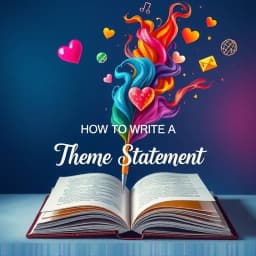
How to Write a Theme Statement
Find this useful? Bookmark ( CTRL/CMD + D ) for quick access!
Try an example:
Literary Analysis Essay
Creative Writing Prompt
High School English Assignment
Theme Exploration Workshop
Book Club Discussion Guide
Film Analysis Project
Explore Similar Tools
Recent Generations
Taco Bar Party Ideas
the amount paid directly to you. Yes it is possible in future cases to request direct payment to the provider, Rephrase and give me polished email.
Claim Email Template
we have processed the claim as per the attachments in the claim submission we have processedthe invoice for Saul Holding. We dont have invoice for the Salofalk.
Claim Email Template
this additional information is very important. this adiitional information was requested by our clinical team. Without clinical review claim not be paid so please share the below additional information
How To Write A Theme Statement
How To Write A Theme Statement is a powerful AI-powered writing assistant that helps users craft clear and concise theme statements for literary analysis. This innovative solution combines advanced natural language processing with user-friendly guidance to deliver well-structured and insightful statements that enhance understanding of literary works.
Key Capabilities
- Guided Theme Development with step-by-step prompts that help users articulate their thoughts clearly.
- Customizable Templates enabling users to create theme statements tailored to specific texts or assignments.
- Real-Time Feedback for refining and improving theme statements, ensuring clarity and depth in analysis.
- Literary Examples for inspiration, providing users with a range of themes from classic and contemporary literature.
Who It's For
Designed for students, educators, and literary enthusiasts, How To Write A Theme Statement excels in academic settings and personal study. Whether you're preparing for an essay, a class discussion, or simply seeking to deepen your literary comprehension, this tool streamlines your writing process and enhances your analytical skills.
Why Choose How To Write A Theme Statement
What sets How To Write A Theme Statement apart is its intuitive interface and comprehensive support, making it the ideal solution for anyone looking to master the art of theme analysis in literature.
Ready to transform your literary analysis? Start using How To Write A Theme Statement today and experience the difference in your writing!
Enhance Your Work with How to Write a Theme Statement
Leverage the power of AI to streamline your tasks with our How to Write a Theme Statement tool.
Guided Theme Development
Step-by-step guidance to help you craft a clear and concise theme statement for your writing.
Customizable Templates
Access a variety of templates tailored for different genres and styles to streamline your writing process.
Instant Feedback
Receive immediate feedback on your theme statement, ensuring clarity and depth in your writing.
How How to Write a Theme Statement Works
Discover the simple process of using How to Write a Theme Statement to improve your workflow:
Select a Literary Work
Choose a book, poem, or play that you want to analyze for its theme.
Identify Key Elements
Highlight important characters, events, and symbols that contribute to the theme.
Generate Theme Statements
Use the AI tool to create concise theme statements based on your analysis.
Refine and Finalize
Review the generated theme statements and make any necessary adjustments for clarity.
Use Cases of
How to Write a Theme Statement
Explore the various applications of How to Write a Theme Statement in different scenarios:
Literary Analysis
Assist students and educators in crafting concise theme statements for literary works, enhancing comprehension and discussion.
Essay Writing
Guide writers in developing clear and focused theme statements for essays, improving the overall coherence and argumentation.
Creative Writing
Help authors articulate the central themes of their narratives, ensuring that their stories convey intended messages effectively.
Curriculum Development
Support educators in designing lesson plans that emphasize theme exploration, fostering critical thinking and analytical skills in students.
Who Benefits from How to Write a Theme Statement?
AI-Powered Efficiency
From individuals to large organizations, see who can leverage How to Write a Theme Statement for improved productivity:
Students
Enhance literary analysis skills by learning to articulate theme statements effectively.
Writers
Develop a clearer understanding of themes in their work to strengthen storytelling.
Educators
Facilitate classroom discussions on literature by teaching students how to write theme statements.
Literary Critics
Analyze and critique literary works with a focus on thematic elements.
Frequently Asked Questions
What is a theme statement?
A theme statement is a concise summary of the central idea or message of a literary work. It captures the underlying meaning and can be used to analyze the text more deeply.
How does the AI tool help in writing a theme statement?
The AI tool analyzes the text you provide, identifies key themes, and generates a clear and coherent theme statement based on the analysis, making it easier for users to articulate their understanding of the work.
Is the tool suitable for all types of literature?
Yes, the tool is designed to work with various genres of literature, including novels, short stories, poems, and plays. It can adapt to different writing styles and themes.
Can I use the tool for academic purposes?
Absolutely! The tool is ideal for students and educators who need to analyze literature for essays, assignments, or discussions. It helps in developing critical thinking and writing skills.
Is there a limit to the text I can input into the tool?
While there is no strict limit, we recommend keeping the input text concise for optimal analysis. Longer texts may take more time to process, and key themes may be diluted in extensive passages.
































